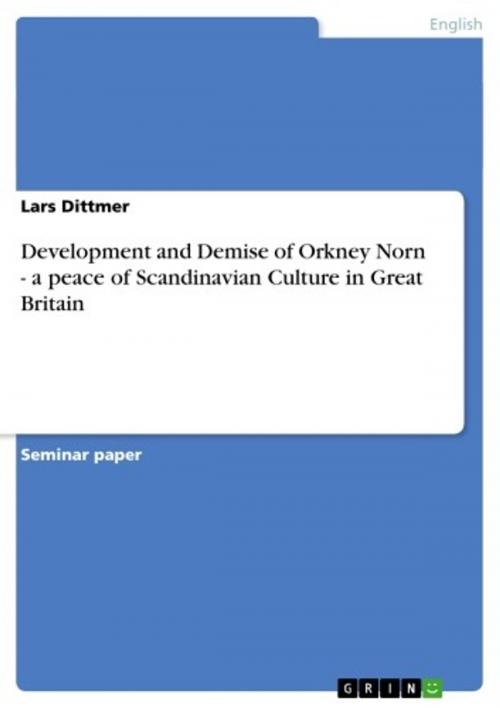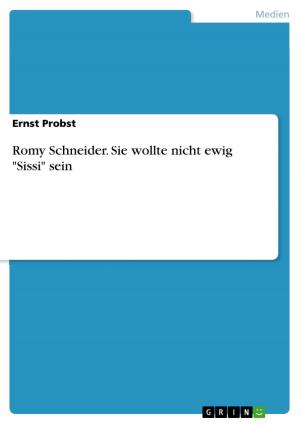Development and Demise of Orkney Norn - a peace of Scandinavian Culture in Great Britain
a peace of Scandinavian Culture in Great Britain
Nonfiction, Entertainment, Drama, Anthologies| Author: | Lars Dittmer | ISBN: | 9783638457712 |
| Publisher: | GRIN Verlag | Publication: | January 18, 2006 |
| Imprint: | GRIN Verlag | Language: | English |
| Author: | Lars Dittmer |
| ISBN: | 9783638457712 |
| Publisher: | GRIN Verlag |
| Publication: | January 18, 2006 |
| Imprint: | GRIN Verlag |
| Language: | English |
Seminar paper from the year 2005 in the subject English Language and Literature Studies - Linguistics, grade: 1,7, University of Potsdam (Philosophisches Institut), course: Proseminar The demise of Celtic languages and rise, 8 entries in the bibliography, language: English, abstract: the Nordic cross in Great Britain The unofficial flag of the Orkney Islands arouses astonishment in the watcher and gives him an idea of how Orcadians feel - being a Scandinavian, and being British. The flag shows the red Norwegian cross on a yellow background, symbolizing the Scottish Royal flag (cf. Towrie 1996-2005: FAQ). Scandinavian culture and self-image still constitute a part of identity in parts of Scotland - especially in Shetland and Orkney, collectively named the Northern Islands. Here, this cultural background has over centuries found expression through a Scandinavian language, called Norn, Icelandic nor?nna, the Norwegian language (Fenton 1997: 617). This term paper is to document the historical and cultural circumstances in which a Scandinavian language could develop in Northern Scotland, its nature and prevalence during its era, and finally, its demise and the remains of Norn in today's language in Orkney. The paper attaches importance to the fact that it is on the one hand power constellations and politics that produce linguistic changes such as the death of a language, but on the other hand also requires 'the active participation of its former speakers' (Barrett 2003: 98). The paper almost exclusively focuses on the development on the Orkney Islands, taking into consideration that history as well as the language itself differs to some extent on the Shetland Islands.
Seminar paper from the year 2005 in the subject English Language and Literature Studies - Linguistics, grade: 1,7, University of Potsdam (Philosophisches Institut), course: Proseminar The demise of Celtic languages and rise, 8 entries in the bibliography, language: English, abstract: the Nordic cross in Great Britain The unofficial flag of the Orkney Islands arouses astonishment in the watcher and gives him an idea of how Orcadians feel - being a Scandinavian, and being British. The flag shows the red Norwegian cross on a yellow background, symbolizing the Scottish Royal flag (cf. Towrie 1996-2005: FAQ). Scandinavian culture and self-image still constitute a part of identity in parts of Scotland - especially in Shetland and Orkney, collectively named the Northern Islands. Here, this cultural background has over centuries found expression through a Scandinavian language, called Norn, Icelandic nor?nna, the Norwegian language (Fenton 1997: 617). This term paper is to document the historical and cultural circumstances in which a Scandinavian language could develop in Northern Scotland, its nature and prevalence during its era, and finally, its demise and the remains of Norn in today's language in Orkney. The paper attaches importance to the fact that it is on the one hand power constellations and politics that produce linguistic changes such as the death of a language, but on the other hand also requires 'the active participation of its former speakers' (Barrett 2003: 98). The paper almost exclusively focuses on the development on the Orkney Islands, taking into consideration that history as well as the language itself differs to some extent on the Shetland Islands.















